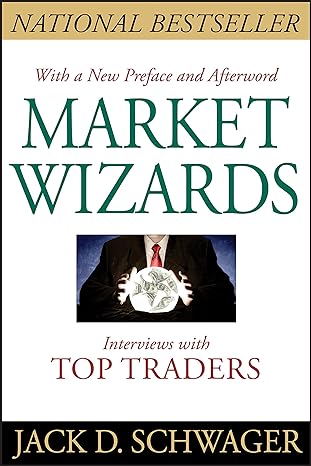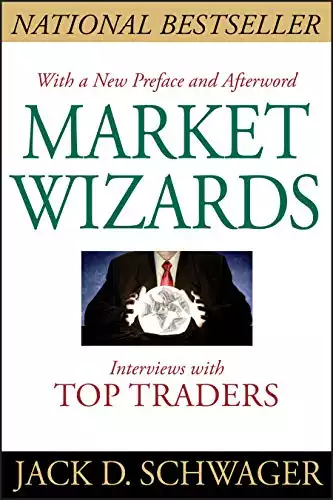Overview : Market Wizards By Jack D. Schwager
-
Book Title: Market Wizards
-
Author: Jack D. Schwager
-
Publication Date: April 1989
-
Rating: 5
-
price: $18.29
-
Pages: 458
About the Author
"Market Wizards," authored by Jack D. Schwager, delves into the minds of top traders who have made remarkable fortunes in financial markets. Through in-depth interviews, Schwager uncovers their strategies, mindsets, and secrets to success, offering readers invaluable insights into the world of high-stakes trading.
Introduction to Market Wizards By Jack D. Schwager
In the ever-evolving world of finance and investing, few books have stood the test of time quite like Jack D. Schwager's "Market Wizards: Interviews with Top Traders." First published in 1989, this seminal work continues to inspire and educate traders and investors across generations. Through a series of in-depth interviews with some of the most successful traders of the era, Schwager provides readers with unprecedented access to the minds that have mastered the art of market navigation.
Market Wizards Book Summary
"Market Wizards" is more than just a collection of interviews; it's a roadmap to trading success. Schwager's masterful approach allows each featured trader to share their unique journey, philosophy, and strategies that led them to the pinnacle of their profession. From futures and equities to options and currencies, the book covers a diverse range of markets and trading styles.
Key figures interviewed include:
- Bruce Kovner - Macroeconomic trading expert
- Paul Tudor Jones - Legendary hedge fund manager
- Ed Seykota - Pioneer of computerized trading systems
- Richard Dennis - Creator of the famous Turtle Trading experiment
Analysis of Themes: The Pillars of Trading Triumph
1. Psychological Discipline
A recurring theme throughout the book is the critical importance of mental fortitude in trading. As Paul Tudor Jones emphasizes:
"The most important rule of trading is to play great defense, not great offense."
This underscores the significance of emotional control and risk management in achieving long-term success.
2. Personalized Trading Strategies
While the interviewed traders employ diverse methods, they all stress the importance of developing a strategy that aligns with one's personality and risk tolerance. This personalization is crucial for consistency and longevity in the markets.
3. Rigorous Risk Management
Perhaps the most emphasized lesson in "Market Wizards" is the paramount importance of risk management. Ed Seykota's famous quote encapsulates this principle:
"The key to long-term survival and prosperity has a lot to do with the money management techniques incorporated into the technical system."
4. Continuous Learning and Adaptation
The book highlights how successful traders remain students of the market, constantly evolving their strategies to adapt to changing conditions. This commitment to lifelong learning is a hallmark of trading excellence.
Writing Style: Engaging and Accessible
Schwager's writing style is both engaging and accessible, making complex trading concepts understandable to readers of all levels. His ability to draw out insightful responses from his interviewees and present them in a coherent narrative is commendable. The book's structure, with each chapter dedicated to a different trader, allows readers to digest the material at their own pace and revisit specific sections for deeper study.
Strengths and Weaknesses of Market Wizards Book
Strengths:
- Diverse perspectives from top traders
- Timeless principles applicable to modern markets
- Blend of technical knowledge and psychological insights
- Inspirational stories of perseverance and success
Weaknesses:
- Some market examples may feel dated
- Limited coverage of newer trading technologies
- Lack of focus on specific asset classes like cryptocurrencies
Market Wizards Related Books
While "Market Wizards" stands out for its interview format and focus on individual traders, it's worth comparing it to other influential trading books:
- Reminiscences of a Stock Operator" by Edwin Lefèvre - A classic that offers similar insights through a fictionalized narrative
- "Trading in the Zone" by Mark Douglas - Focuses more deeply on the psychological aspects of trading
- "The Intelligent Investor" by Benjamin Graham - Provides a fundamental analysis approach to investing, complementing the trading strategies in "Market Wizards"
Highlights from Market Wizards by Jack D. Schwager
Discipline and Consistency: Successful traders prioritize discipline and stick to their strategies, even in challenging markets.
Risk Management: Emphasizes the importance of controlling losses through strict risk management and position sizing.
Adaptability: The best traders adjust to changing markets rather than forcing strategies that don’t fit.
Psychology Over Predictions: Winning trades often stem from mindset and emotional control, not just market forecasts.
Learning from Losses: Mistakes and losses are seen as valuable lessons that shape better trading habits.
Passion for Trading: Many successful traders have an intense passion for markets and continuous learning.
Conclusion: A Must-Read for Aspiring Market Masters
"Market Wizards" remains an indispensable resource for anyone serious about trading and investing. Its lessons on discipline, risk management, and the psychology of trading are as relevant today as they were when the book was first published. Whether you're a novice trader looking to understand market dynamics or an experienced professional seeking to refine your approach, Schwager's work offers valuable insights that can elevate your trading game.
In today's fast-paced financial landscape, where algorithmic trading and high-frequency strategies dominate, the human elements of decision-making and emotional control highlighted in "Market Wizards" are more crucial than ever. As markets evolve and new asset classes like cryptocurrencies emerge, the foundational principles outlined in this book continue to provide a solid framework for success.
For those looking to deepen their understanding of financial markets and trading strategies, "Market Wizards" is an essential addition to your library. Its timeless wisdom has the power to transform your approach to trading and potentially your financial future.





